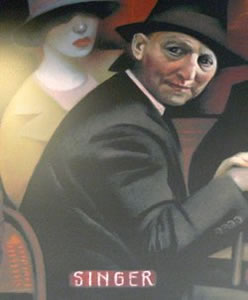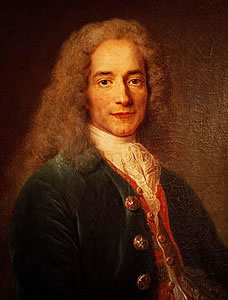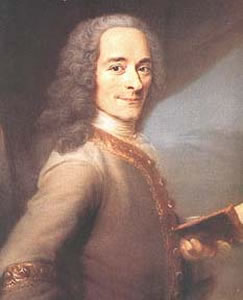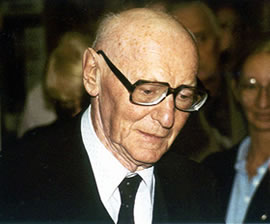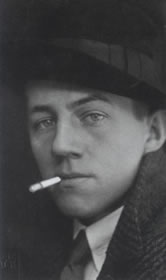De Amerikaans-Poolse schrijver Isaac Bashevis Singer werd geboren op 21 november 1904 als Isaac Hertz Singer in Radzymin, Polen. Zie ook mijn blog van 21 november 2006 en ook mijn blog van 21 november 2007.
Uit: Old Love
“This summer day began like all the others. Harry prepared his breakfast in the kitchen – Rice Krispies with skimmed milk and Sanka sweetened with saccharin. At about nine-thirty he took the elevator down to get the mail. A day didn’t go by that he didn’t receive a number of checks, but this day brought a bounty. The stocks had fallen, but the companies kept paying the dividends as usual. Harry got money from buildings on which he held mortgages, from rents, bonds, and all kinds of business ventures that he barely remembered. An insurance company paid him an annuity. For years he had been getting a monthly check from Social Security. This morning’s yield came to over eleven thousand dollars. True, he would have to withhold a great part of this for taxes, but it still left him with some five thousand dollars for himself. While he totaled up the figures, he deliberated: Should he go to the office of Merrill Lynch and see what was happening on the Exchange? No, there was no point to it. Even if the stocks rose early in the morning, the day would end in losses. “The market is completely crazy,” he mumbled to himself. He considered it an iron rule that inflation always went along with a bullish market, not with a bearish market. But now both the dollar and the stocks were collapsing. Well, you could never be sure about anything but death.”

Isaac Bashevis Singer (21 november 1904 – 24 juli 1991)
De Amerikaanse schrijfster en literatuurwetenschapster Marilyn French werd geboren op 21 november 1929 in New York. Zie ook mijn blog van 21 november 2007.
Uit: From Eve to Dawn : A History of Women
„It was the lowest point in women’s history: a male historian has pointed out that nineteenth-century British women had fewer rights than Babylonian women possessed when Hammurabi’s Code was written.1 Moreover, British women were no worse off than women in other Western countries, and perhaps better off than women in Eastern societies.
But the nineteenth century was also the period in which women as a caste for the first time stood up en masse and demanded an end to subjugation. Hard-earned victories gradually won them the right to acquire advanced education, to learn a profession and actually practise it, and to own their personal property. From the perspective of this book, it is the most cheering period in female history, the moment the tide began to turn.
It was just such a period for workers, too (many of whom were now women); they also began to stand up and protest wages that were inadequate to maintain life, as well as inhumane working conditions and hours. Middle-class people, including many women, sided with the workers, arguing also that tiny children should not be working in factories, tied to machines, and that all children should be decently fed, healed, and educated.
But of course, such arguments would not have been necessary if the actual conditions of life were not so hellish. Cities were overcrowded, filthy, and unhealthy; factories were unsanitary and unhygienic, and workers were treated worse than animals. Yet even so, agricultural workers often found factory work preferable to work on the farm, which was brutally hard and demeaning.
To complete the picture of this age of contrasts, it was also a period when socialists (and others) began to envision better ways of living, inventing utopian schemes for living and working in harmony with nature and the machine. Some of these schemes were realized, in towns that still stand (as ruins) in England and the United States. But none of them were successful, largely because men continued to exploit women.“

Marilyn French (New York, 21 november 1929)
De Britse schrijfster Freya North werd geboren op 21 november 1967 in Londen. Zij studeerde kunstgeschiedenis, maar brak die studie 1991 af. Ze besloot een totaal andere richting op te gaan en schrijfster te worden. Ze deed freelance- en uitzendwerk om daarnaast aan haar eerste roman, Sally (1996), te kunnen werken. Aan de publicatie van dit boek gingen echter heel wat afwijzingen vooraf. Ze begon met goede moed aan een tweede roman, Chloe (1997). Ze stuurde een uitgever drie hoofdstukken en een aantal zelfgeschreven recensies, en met succes: ze kreeg een deal voor drie boeken aangeboden, waaronder Sally, Chloe en Polly (1998). Vanaf dat moment kwam haar carriere in een stroomversnelling. De filmrechten van Polly werden meteen verkocht en in de daarop volgende jaren verschenen Cat (1999), Fen (2001), Pip (2003), Love Rules (2005) en Home Truths (2006).
Uit: Pip
„From her doctor’s coat pockets she lays out the tools of her trade and wipes everything with antiseptic cloths. A comedy stethoscope. Five different types of magic wand. Small red foam balls that, with a little surreptitious rubbing between the palms, or a heartfelt ‘abracadabra’ from a child, metamorphose into a selection of miniature animals. A huge pair of plastic scissors. Handfuls of stickers. The squeaking plastic hammer. She takes off her doctor’s coat. It’s a real doctor’s coat, in thick white cotton, but embellished with colourful patterns on the pockets and with her name, ‘Dr Pippity’, emblazoned on the back like some kind of patchwork tattoo. An intricate circuit and a couple of AAA batteries enable her to make the squeaks and dongs. She takes off her luridly striped pinafore, with
the flowers on springs attached to the kangaroo-style pouch, the badges dotted here and there with ‘I am 8’ and ‘smile’ and various cartoon characters. She peels off her tights – she customized this pair so that one leg has multicoloured dots and the other has wriggling lines.
She showed them off that afternoon, very forlornly, to a girl with no hair up on Gainsborough, the cancer ward.
‘I’ve not got no hair no more’, the child had told her. Dr Pippity had sat beside her and stretched her legs out. ‘This leg here,’ she showed the girl, ‘has the multicoloured measles.’ The girl gingerly placed a finger over the spots to check. ‘And this leg here’, Dr Pippity declared, ‘has worms!’

Freya North (Londen, 21 november 1967)
De Nederlandse schrijfster Margriet de Moor werd als Margaretha Maria Antonetta Neefjes op 21 november 1941 in Noordwijk geboren.De Moor bezocht na de ULO het Koninklijk Conservatorium in Den Haag waar ze piano en solozang studeerde. Daarna studeerde zij kunstgeschiedenis en archeologie, gaf pianoles en maakte videofilms voordat ze debuteerde als schrijver. In 1988 debuteerde ze onder de naam Margriet de Moor met Op de rug gezien, een bundel verhalen. De bundel werd zeer goed ontvangen, genomineerd voor de AKO-literatuurprijs en won het Gouden Ezelsoor. De Moors eerste roman, Eerst grijs dan wit dan blauw uit 1991 werd nog luider toegejuicht: het boek kreeg de AKO-literatuurprijs.
Uit: Eerst grijs dan wit dan blauw
“Waarom komt het nooit in haar op mijn agenda door te bladeren, mijn binnenzakken te doorzoeken? Na afloop van een feestje haalt ze mij over een eenzame vriendin met de auto weg te brengen. Hoe moet ik haar het volgende betaald zetten: terwijl ik voor de dame de buitendeur openhoud, zie ik vanuit een ooghoek hoe ze in gebukte houding de ijskast staat in te ruimen, haar nauwe rok kruipt alvast vertrouwelijk omhoog, ze weet maar al te goed dat ik binnen de korste keren terug ben…”

Margriet de Moor (Noordwijk, 21 november 1941)
De Oostenrijkse schrijfster en vertaalster Veza Canetti werd als Venetiana Taubner-Calderon geboren op 21 november 1897 in Wenen. Haar moeder was sefardisch, haar vader Homgaars-joods. Na WO I werkte de hoogbegaafde, maar gehandicapte Canetti als lerares Engels. In 1927 ontmoette zij de schrijver Elias Canetti met wie zij zeven jaar later trouwde. In 1933 verscheen haar verhaal „Der Kanal“ in de Wiener Arbeiter-Zeitung. Onder het pseudoniem Veza Magd vertaalde zij uit het Engels o.a. „The Power and the Glory“ van Graham Greene. Voor haar eigen romans vond zij tijdens haar leven geen uitgever. Jarenlang was zij wel de literaire adviseur van haar man. Vera Canetti stierf in 1963 in Londen, waarschijnlijk door zelfmoord. In 1990 gaf Elias Cantetti manuscripten uit haar nalatenschap vrij voor publicatie.
Uit: Der Fund
„Im Winter des Jahres 1940 übersiedelten wir aufs Land in das geräumige Haus eines Pastors und seiner hageren Ehefrau. Die Bedingungen waren durchwegs Verbote. Verboten war der Fleischgenuß, der Alkohol, das Rauchen, der Theaterbesuch und der Verkehr mit den Nachbarn. Das Prinzip des pensionierten Geistlichen lautete: wenn das Empire die von Gott Gezeichneten einläßt, und ich sie gar ins Haus nehme, so haben sich mir diese Flüchtlinge für die Großmut Englands dankbar zu erweisen, und sie haben mir möglichst viel Nutzen zu bringen. Denn sie wetzen die Teppiche ab, ziehen den Zug im Abtritt und schauen durchs Fenster. Sie zahlen, das ist richtig, aber was ist Geld, wei eitel ist es, welcher Schein in den Augen eines Dieners Gottes. Morgens in aller Früh wurde Kompost erzeugt. Die beiden Toogoods taten dies auf eigene Weise, nämlich auf Zeitungspapier, und trugen diesen Schatz, der ihrem Leib entsprossen, hinunter in den Gemüsegarten, wo sie ihn nach einem Jahr in der Form von Karotten zurückbekamen. Denn sparsam sei der Mensch und vergeude nichts, auch nicht seine Exkremente, dann wird der Herr es ihm lohnen. Und richtig, der Herr lohnte es. Wer hat, dem wird gegeben, und sie hatten. Sie hatten ein großes Haus mit vielen Teppichen und hellen Möbeln, sie hatten feingeschnitzte Truhen und kostbare Altertümer. Und ein Zimmer voll mit Vorräten, alle angekauft knapp ehe der Krieg ausbrach, um ihre alten Knochen aufs beste zu versorgen.
Sie hatten und nährten sich redlich. Wir hatten nichts und hungerten.
Für diesen Hunger hörten wir salbungsvolle Reden, etwa, daß man im Krieg genügsam leben müsse. Um sich für ihre Worte zu stählen, aßen sie heimlich ihre guten Speisen, und wir bekamen die Karotten, die der Herr ihnen erwachsen ließ.
Dafür aber waren sie freundlich. Mit überaus freundlicher Miene häufte uns Frau Pastor den in Wasser gekochten Kohl auf den Teller, dazu gab es Wasserkartoffel, freilich nur eine, denn sie kosteten fast einen Penny das Pfund, wiewohl nicht sie, nicht Frau Pastor, sie hatte eine Quelle, wo sich das Hundert erheblich billiger stellte, diese Kartoffel war freilich säuerlic
h und mit schwärzlicher Fäulnis durchsetzt, aber da blickte Frau Pastor weg und sprach davon, wie schlecht die Welt, und sie dachte, wie gut sie selbst war, die unserethalben, um unsere Seelen zu retten, diese schwarzen Trümmer aß.”
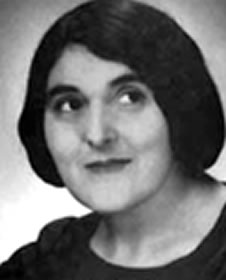
Veza Canetti (*21 november 1897 – mei 1963)
De Engelse schrijver en crticus Sir Arthur Thomas Quiller-Couch werd geboren op 21 november 1863 in Bodmin, Cornwall. Quiller-Couch studeerde aan het Trinity College in Oxford en werkte daarna als docent klassieke talen. In 1887 debuteerde hij met zijn roman Dead man’s rock. Hij publiceerde zijn leven lang veel onder zijn pseudoniem „Q“. In 1912 werd hij hoogleraar Engelse literatuur in Cambridge. Zijn avonturenromans tonen gelijkenis met die van Louis Stevenson. Hij voltooide zelfs een van diens romans.
Uit: On the Art of Writing
„And Flaubert, that gladiator among artists, held that, at its highest, literary art could be carried into pure science. ‘I believe,’ said he, ’that great art is scientific and impersonal. You should by an intellectual effort transport yourself into characters, not draw them into yourself. That at least is the method.’ On the other hand, says Goethe, ‘We should endeavour to use words that correspond as closely as possible with what we feel, see, think, imagine, experience, and reason. It is an endeavour we cannot evade and must daily renew.’ I call Flaubert’s the better counsel, even though I have spent a part of this lecture in attempting to prove it impossible. It at least is noble, encouraging us to what is difficult. The shrewder Goethe encourages us to exploit ourselves to the top of our bent. I think Flaubert would have hit the mark if for ‘impersonal’ he had substituted ‘disinterested.’
For–believe me, Gentlemen–so far as Handel stands above Chopin, as Velasquez above Greuze, even so far stand the great masculine objective writers above all who appeal to you by parade of personality or private sentiment.
Mention of these great masculine ‘objective’ writers brings me to my last word: which is, ‘Steep yourselves in them: habitually bring all to the test of them: for while you cannot escape the fate of all style, which is to be personal, the more of catholic manhood you inherit from those great loins the more you will assuredly beget.’
This then is Style. As technically manifested in Literature it is the power to touch with ease, grace, precision, any note in the gamut of human thought or emotion.
But essentially it resembles good manners. It comes of endeavouring to understand others, of thinking for them rather than for yourself–of thinking, that is, with the heart as well as the head. It gives rather than receives; it is nobly careless of thanks or applause, not being fed by these but rather sustained and continually refreshed by an inward loyalty to the best. Yet, like ‘character’ it has its altar within; to that retires for counsel, from that fetches its illumination, to ray outwards. Cultivate, Gentlemen, that habit of withdrawing to be advised by the best. So, says Fénelon, ‘you will find yourself infinitely quieter, your words will be fewer and more effectual; and while you make less ado, what you do will be more profitable.’

Arthur Quiller-Couch (21 november 1863 – 12 mei 1944)
De Duitse dichter en schrijver Wilhelm Friedrich Waiblinger werd geboren op 21 november 1804 in Heilbron. Vanaf 1822 studeerde hij theologie aan de Tübinger Stift, waar hij filologie als bijvak kon hebben. Op 3 juli 1822 ontmoette Waiblinger voor het eerst de toen al vijftien jaar voor waanzinnig gehouden dichter Friedrich Hölderlin in de Hölderlinturm in Tübingen. Hij zou er gedurende zijn hele studietijd vaak te gast zijn. Deze ontmoetingen verwerkte hij in zijn briefroman Phaeton uit 1823. Later schreef hij een uitvoerig portret van Hölderlin in Hölderlin’s Leben, Dichtung und Wahnsinn. Tijdens zijn studentenjaren behoorde ook de dichter Eduard Mörike tot Waiblingers vriendenkring.
Uit: Phaeton
„Dein Bruder ist jetzt abgereist. Mir ward der Abschied schwer von dem Guten, der wie mein Schatten mir durchs sonnige Italien folgte. Ewigunvergeßlich wie meiner Kindheit Tage ist mir der Abend, wo wir zum erstenmal die Alpenfirnen wie Trümmer einer Urwelt glänzen sahn, und gleich gebändigten Titanen die Nebelwolken unten lagen im Tale, und oben die milchweißen Stirnen vom Purpur der Abendsonne glühten wie bescheidene Mädchenwangen, und die Riesenlawinen donnernd von jähen fürchterlichen Höhn herab sich wälzten, wir uns im Arme lagen und bei Tells und Arnolds Vaterland uns ewige Freundschaft schwuren!
Und als wir gingen auf den sieben Hügeln und wandelten zwischen den schaurigen Gestalten der hohen Vorwelt und sahn, wie um die alten düstern Mauern sich der jugendliche Efeu rankte; als wir saßen an den Ufern der blonden Tiber und ihrem Wellenschlage lauschten, und es aus den Wassern erklang zu uns, den Spätgebornen, wie eine ernste mahnende Stimme, als wir wandelten durch die langen Hallen, wo schweigend unsre alten Götter standen, und wir uns anblickten und uns in die Arme sanken, ach, da wo jeder graue moosbewachsne Trümmer, wo jedes Säulenstück, wo jeder Grashalm an den finstern Mauerrissen, wo alles, alles zu uns sprach: da fühlten wir schwellen unsern Busen. Die Ahnung floh, und es ward klar vor uns. Unser Auge schwamm in Licht und Fülle, und wie eine göttliche Erscheinung sahn wir niederquellen den Geist der Schönheit. Wir fühlten unsern Beruf und den Drang in unserem Innern und knieten nieder und riefen: Dir, heilige Kunst, dir weihn wir unser Leben!“

Wilhelm Waiblinger (21 november 1804 – 17 januari 1830)
De Franse schrijver Voltaire, (pseudoniem van François-Marie Arouet) werd werd op 21 november 1694 geboren in Parijs. Zie ook mijn blog van 21 november 2006 en ook mijn blog van 21 november 2007.
Uit Essai sur les moeurs et l’esprit des nations
„„Souvent les institutions les plus sages ne furent dues qu’à l’aveuglement et à la faiblesse. Il n’y a guère dans l’Église de cérémonie plus noble, plus pompeuse, plus capable d’inspirer la piété aux peuples, que la fête du saint-sacrement. L’antiquité n’en eut guère dont l’appareil fût plus auguste. Cependant, qui fut la cause de cet établissement ? Une religieuse de Liège, nommée Moncornillon, qui s’imaginait voir toutes les nuits un trou à la lune (1264) : elle eut ensuite une révélation qui lui apprit que la lune signifiait l’Église, et le trou une fête qui manquait. Un moine, nommé jean, composa avec elle l’office du Saint-Sacrement ; la fête s’en établit à Liège, et Urbain IV l’adopta pour toute l’Église.
Au douzième siècle, les moines noirs et les blancs formaient deux grandes factions qui partageaient les villes, à peu près comme les factions bleues et vertes partagèrent les esprits dans l’empire romain. Ensuite, lorsqu’au treizième siècle les mendiants eurent du crédit, les blancs et les noirs se réunirent contre ces nouveaux venus, jusqu’à ce qu’enfin la moitié de l’Europe s’est élevée contre eux tous. Les études des scolastiques étaient alors et sont demeurées, presque jusqu’à nos jours, des systèmes d’absurdités, tels que, si on les imputait aux peuples de la Taprobane, nous croirions qu’on les calomnie. « On agitait si Dieu peut produire la nature universelle des choses, et la conserver, sans qu’il y ait des choses ; si Dieu peut être dans un prédicat, s’il peut communiquer la faculté de créer, rendre ce qui est fait non fait, changer une femme en fille; si chaque personne divine peut prendre la nature qu’elle veut ; si Dieu peut être scarabée et citrouille; si le père produit le fils par l’intellect ou la volonté, ou par l’essence, ou par l’attribut, naturellement ou librement ? » Et les docteurs qui résolvaient ces questions s’appelaient le grand, le subtil, l’angélique, l’irréfragable, le solennel, l’illuminé, l’universel, le profond.“

Voltaire (21 november 1694 – 30 mei 1778)
De Duitse schrijver en vertaler Franz Hessel werd geboren op 21 november 1880 in Stettin. Zie ook mijn blog van 21 november 2006.

